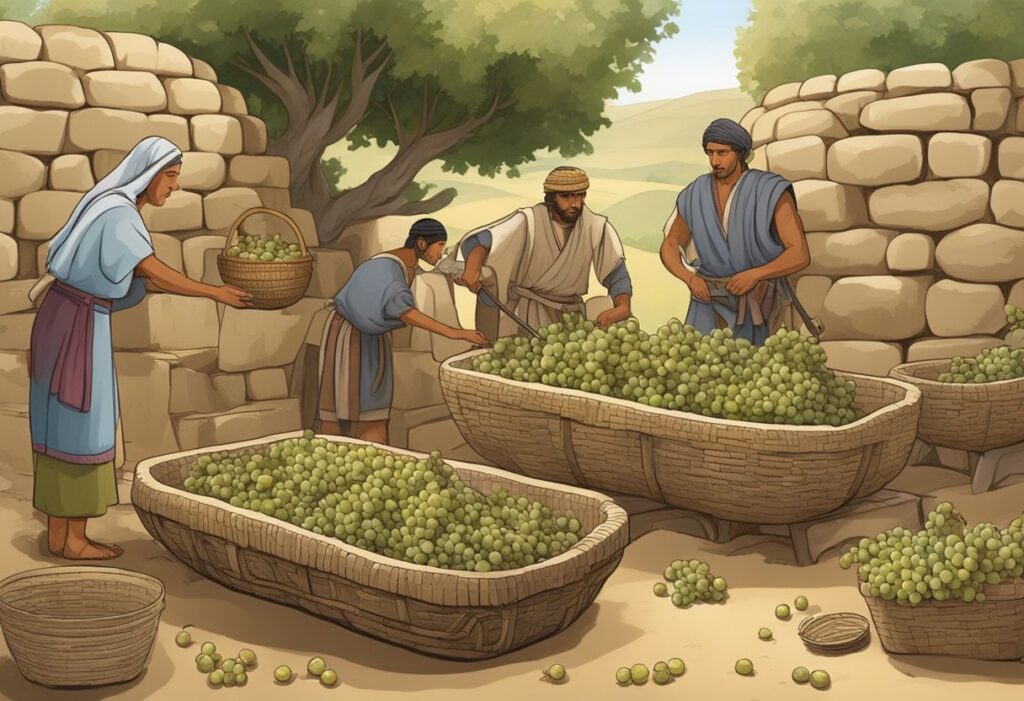Ancient Egypt is renowned for its rich history and monumental architecture, but one of its lesser-known contributions to civilization is its development of winemaking. Your exploration of Egyptian wine culture reveals a tradition steeped in antiquity, reaching back to circa 1500 BC.
In a land where the Nile fostered life, grape cultivation flourished, enabling the Egyptians to not only produce wine but turn it into an art form deeply integrated with their daily life, beliefs, and economy.

Wine in Ancient Egypt was far more than a mere drink; it was a symbol of status, a gift to the gods, and a necessity for both the living and the dead. The Nile Delta region became a hub for a sophisticated royal winemaking industry that served the ceremonial needs of the pharaohs.
Your understanding of the social and cultural fabric of ancient Egyptian society will be enriched by exploring how wine was consumed during rituals and how it was a critical element in both religion and health.
Today, the vestiges of this ancient practice can be glimpsed through wine tourism ventures and the ongoing preservation of Egyptian wine history, intertwining the past with the present.
Key Takeaways
- Egyptian wine culture has a storied presence, dating back to ancient civilizations where wine was an integral part of religion and society.
- Grape cultivation and winemaking were well-established arts in the lush Nile Delta, serving as a cornerstone of ancient Egyptian economy and culture.
- Modern appreciation of Egyptian wines is facilitated through tourism and global recognition, continuing the ancient traditions into contemporary times.
Historical Overview of Egyptian Wine
The rich tapestry of Egyptian wine culture is woven with tales of dynastic celebrations, divine offerings, and agricultural practices. Starting from the predynastic period to the influence of Greek and Roman domains, wine has been a symbol of social status, religious significance, and economic trade.
Prehistoric Viticulture in Egypt
Viticulture in Egypt predates much of the world’s ancient wine production. Archaeological evidence suggests that as early as the Neolithic times, indigenous grapes were cultivated in the fertile Nile Delta. Your appreciation for wine can trace its roots back to these early Egyptian vineyards, where primitive yet effective wine-making techniques were developed.
Wine in Ancient Egyptian Society
In Ancient Egypt, wine was more than a mere beverage; it was a symbol of affluence and an integral part of ceremonial life. Pharaohs and nobility often boasted of their wine collections, and vintages were carefully recorded.
It was not uncommon for Egyptians to offer wine to gods as a form of worship or to pour out libations during significant events. The everyday life of an ancient Egyptian revolved around agricultural practices that included wine production, which played a pivotal role in diet and medicine.
Influence of Greek and Roman Rule
The affinity for wine in Egypt endured through the eras of Greek and Roman rule, during which wine trade flourished. The Greeks introduced new varieties of grapes and winemaking techniques, further enriching the already prospering Egyptian vine cultivation.
Under Roman governance, wine became even more accessible, yet Egypt maintained its distinct wine traditions even as it absorbed external influences.
As you delve into ancient viticulture, you’ll find that Egyptian wine’s history is a testament to human ingenuity and the profound cultural importance of this storied beverage. Through each glass, a sip of history tells the tale of a civilization’s relationship with the vine and the divine.
The Cultivation of Grapes and Winemaking Techniques
The region’s warm climate and the fertile soil of the Nile Delta have shaped the unique grape cultivation and traditional winemaking techniques of Egypt. Here is how this ancient art has developed over time, incorporating modern innovations along the way.
Vineyards in the Nile Delta
Viticulture in the Nile Delta takes advantage of the rich silt deposited by seasonal flooding, which provides essential nutrients for the grapevines. You’ll find that vineyards here are strategically located to receive adequate sunlight, helping in the growth of high-quality grapes. The ecosystem of the Nile Delta has given rise to a variety of grapes, each contributing to the distinct flavors of Egyptian wines.
Traditional Egyptian Winemaking
Historically, Egyptian winemaking involved harvesting grapes by hand, which then were transported to be crushed and fermented. In ancient times, fermentation took place in large jars, some of which have been recovered with residues of tartaric acid, affirming the antiquity of winemaking in the region.
Many traditional techniques have been preserved, providing continuity to Egypt’s winemaking heritage, as seen in the findings under the Egywine project.
Modern Innovations in Winemaking
Today’s winemakers still honor traditional methods while also embracing modern innovations. Techniques such as controlled fermentation temperatures and the use of stainless steel tanks have improved the consistency and storage life of wines.
Recent undertakings like the Egywine project also involve paleogenomic analysis, aiming to unveil the genetic history of ancient Egyptian vineyards and grape varieties, showcasing the evolution of winemaking from tradition to contemporary practices.
Your understanding of grapes’ journey from the vineyard to the wine glass is now richer by recognizing their roots in the Nile Delta’s fertile soils and the age-old yet evolving art of winemaking.
Varietals and Characteristics of Egyptian Wines
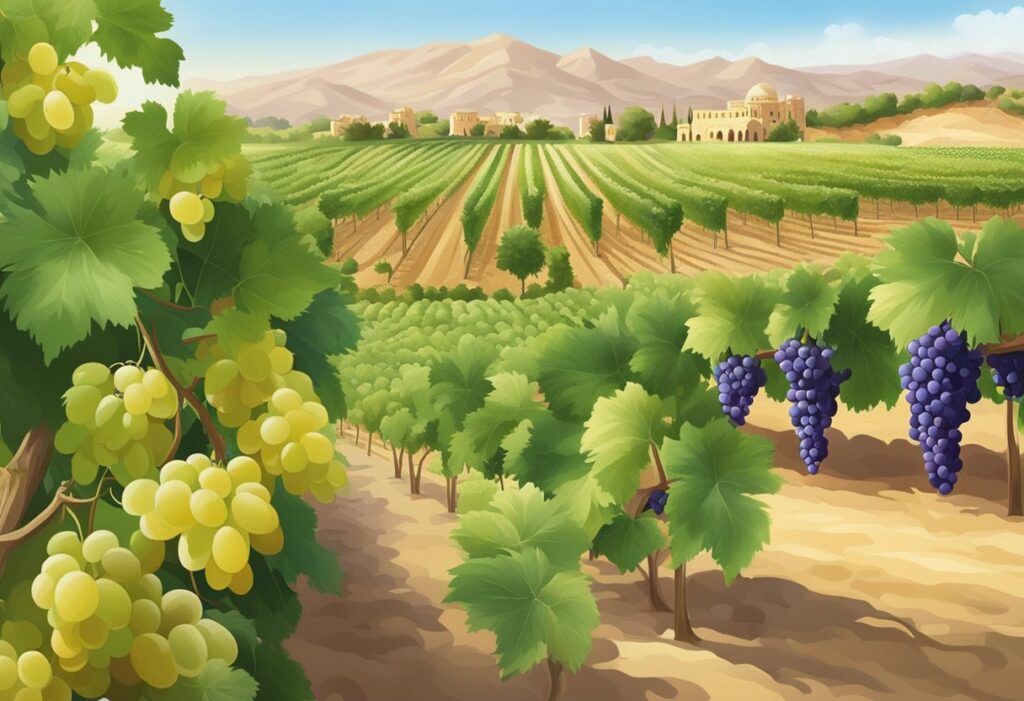
Egyptian wines offer a rich tapestry of tastes, combining indigenous varietals with globally renowned cultivars.
Indigenous Grape Varietals
Witness the novel flavors of Egyptian wine through its native grapes, such as the Bannati. Utilized by Koroum of the Nile, this grape is integral to crafting the intriguing Beausoleil white wine.
Imported Grape Cultivars and Wine Blends
Your palate can explore an array of imported grape varietals cultivated in Egypt, including Cabernet Sauvignon, Syrah, and Grenache. These grapes contribute to the robust profile of Egyptian red wines.
Additionally, varieties like Viognier and Chardonnay enhance the country’s white wine selections, while Egyptian rosé captures the essence of both red and white varietals. To better understand the different hues of wines, such as the deep red of Cabernet or the pale gold of Chardonnay, consider exploring the nuances of wine color.
Economic Impact and the Egyptian Wine Industry
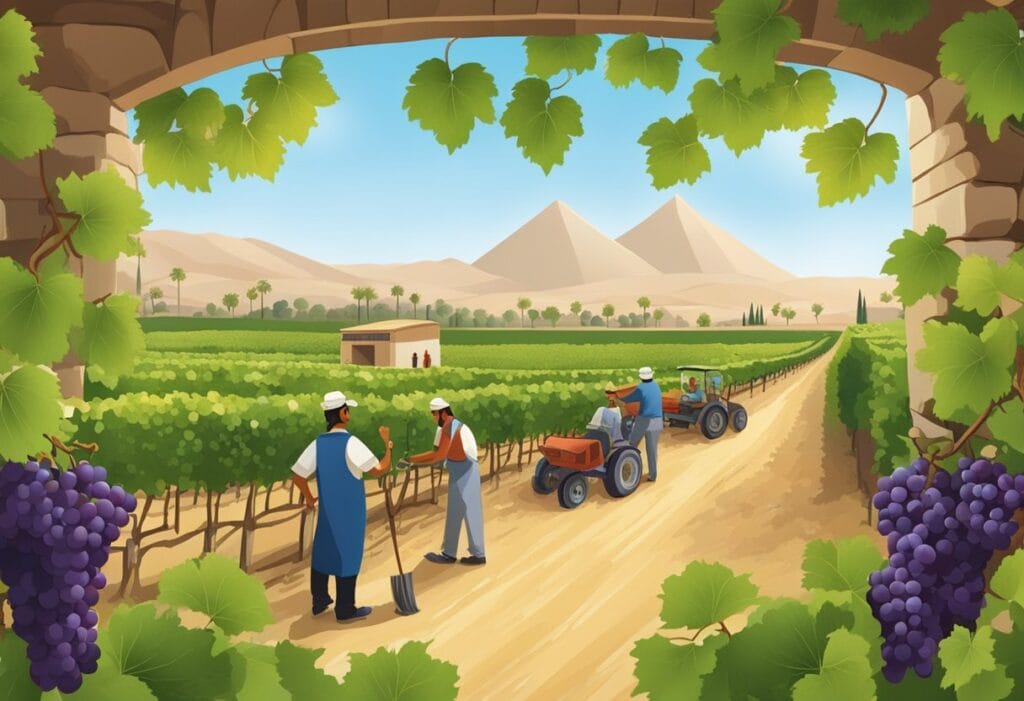
In recent years, your interest in the economic importance of Egyptian wines may have piqued due to its growing domestic production and historical value. The industry holds significant promise for the nation’s economic expansion, blending rich heritage with modern cultivation and trade practices.
From Pharaonic Times to Today’s Market
Wine in Egypt has roots in antiquity, with production practices evolving from the time of the Pharaohs to a modern market that navigates global and local economic landscapes. Ancient winemaking methods involving amphorae significantly influenced the Mediterranean wine trade, marking Egypt as a historical player in the industry.
Today, Egyptian wines, carrying this historical legacy forward, have established Egypt as a rising wine-producing nation within the competitive international market.
Within today’s context, you can observe Al-Ahram Beverages Company and Gianaclis, key players in the Egyptian wine industry, using the historical allure to market their products while adapting to modern winemaking technologies.
With an annual production crossing 4,500 tonnes of wine, these entities contribute substantially to Egypt’s economy through both domestic sales and exports, illustrating the financial potential of continuing the legacy of ancient winemaking traditions in the present day.
Local Production vs. Importation
The intricate balance between boosting local production and the necessity of importation sits at the core of the economic discussion surrounding Egyptian wines. Emphasizing local wine production fosters economic development, reduces dependence on imports, and bolsters the agricultural and manufacturing sectors.
On the one hand, by increasing the capacity of local vineyards and enhancing the quality of Egyptian wines, the country can reduce its reliance on imported wines. This shift has the potential to increase job opportunities within the industry and contribute to a positive trade balance.
On the other hand, the importation of foreign wines caters to a segment of consumers looking for variety and often, premium quality that local products may not yet match.
Balancing these aspects is crucial for the sustained growth and economic impact of Egypt’s wine industry, ensuring that both the allure of local wines and the diversity provided by imports can co-exist to satisfy your varied palates and preferences.
Cultural and Social Aspects of Wine in Egypt
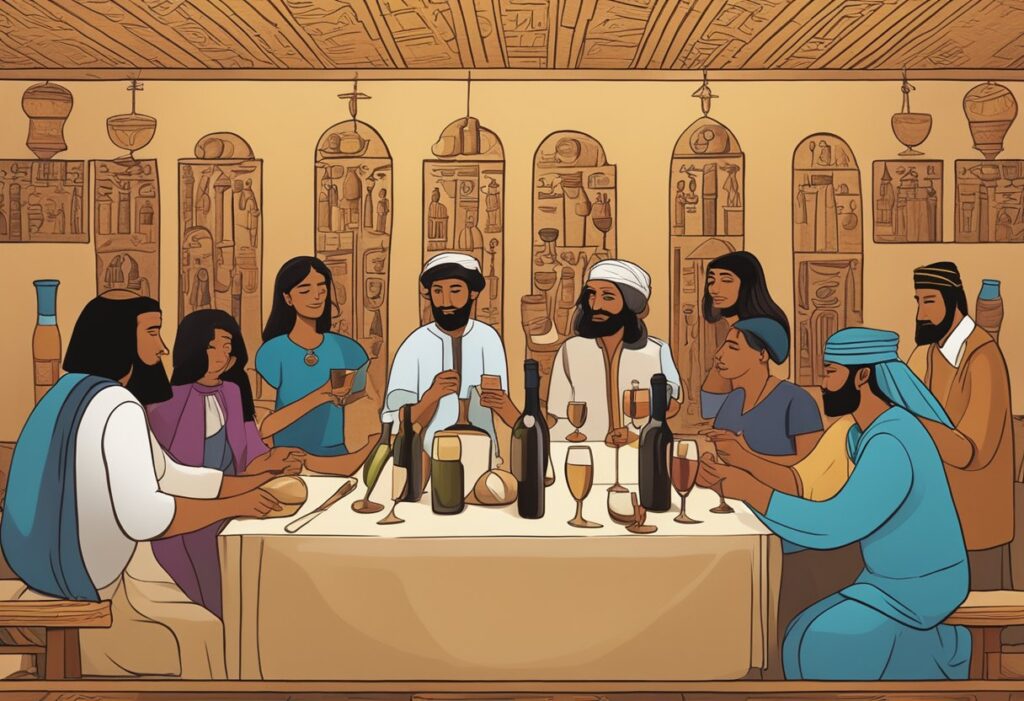
Wine, deeply intertwined with ancient Egyptian civilization, was not merely an indulgence but a significant part of cultural expressions and social structure.
Wine Consumption Among Different Social Classes
In ancient Egypt, wine was predominantly a drink of the nobles and elites. Unlike beer, which was the staple drink of the common folk due to its easier production from barley, wine required more specialized agrarian conditions and was thus less accessible.
Consequently, wine developed into a symbol of social status, often reserved for those in higher echelons of power. Ancient texts and artifacts indicate that nobles would frequently enjoy wine during banquets and feasting events, highlighting its role in upper-class consumption.
Wine’s Role in Festivals and Social Gatherings
During festivals and social gatherings, wine was more than just an alcohol; it had a ceremonial significance. Wine was involved in various religious rites and offerings, adding a sacred dimension to its consumption.
During these events, pouring and drinking wine was featured prominently and it was often incorporated into the revelry, enhancing the communal experience. It can be inferred from records that the ritualistic drinking of wine served to solidify social bonds and mark special occasions.
The Role of Wine in Religion and Mythology
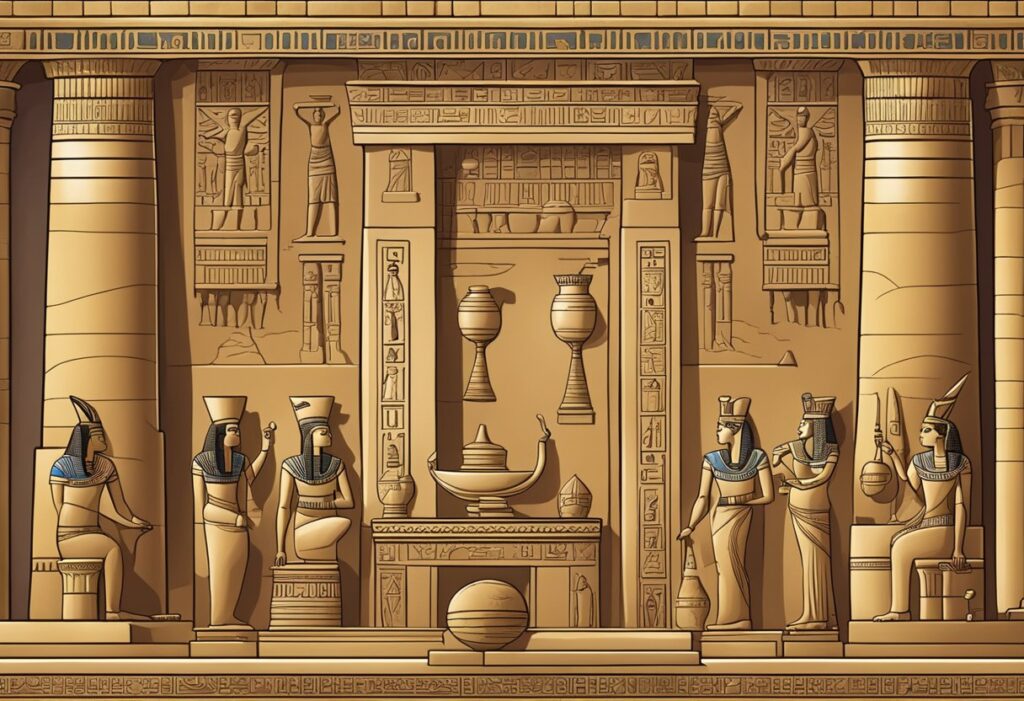
In ancient Egypt, wine was not merely a beverage but an integral part of religious life and mythology. It symbolized blood and life, and held great significance in ritualistic practices and worship.
Wine and Ancient Egyptian Deities
Wine was closely associated with deities in ancient Egypt, playing a crucial part in the sustenance of gods within temples. The belief was that gods consumed wine, and this beverage had the divine capability to please and appease them.
Shedeh, the most prestigious and potent Egyptian wine, was exclusively offered to deities and venerated as one of the finest libations. Priests frequently utilized wine in sacred rituals to honor the gods, believing it had properties that could aid in communication with the divine realm.
Wine in Religious Ceremonies
During religious ceremonies, wine took on a symbolic role representing vitality and resurrection. These rituals often evoked the narrative of Osiris, god of the afterlife, whose association with life and rebirth reinforced the beverage’s symbolism.
In this context, wine was a key component in funerary rites and feasts, affirming the deceased’s hope for a renewed life after death. Participants in these ceremonies would consume wine as part of the communal bonding with the spiritual world, celebrating the eternal cycle of life and death.
Such practices were depicted in tomb paintings and artifacts, underscoring wine’s role in the pursuit of an afterlife.
For more in-depth understanding of wine in antiquity, you may find additional context and examples.
Preservation and Documentation of Wine History in Egypt
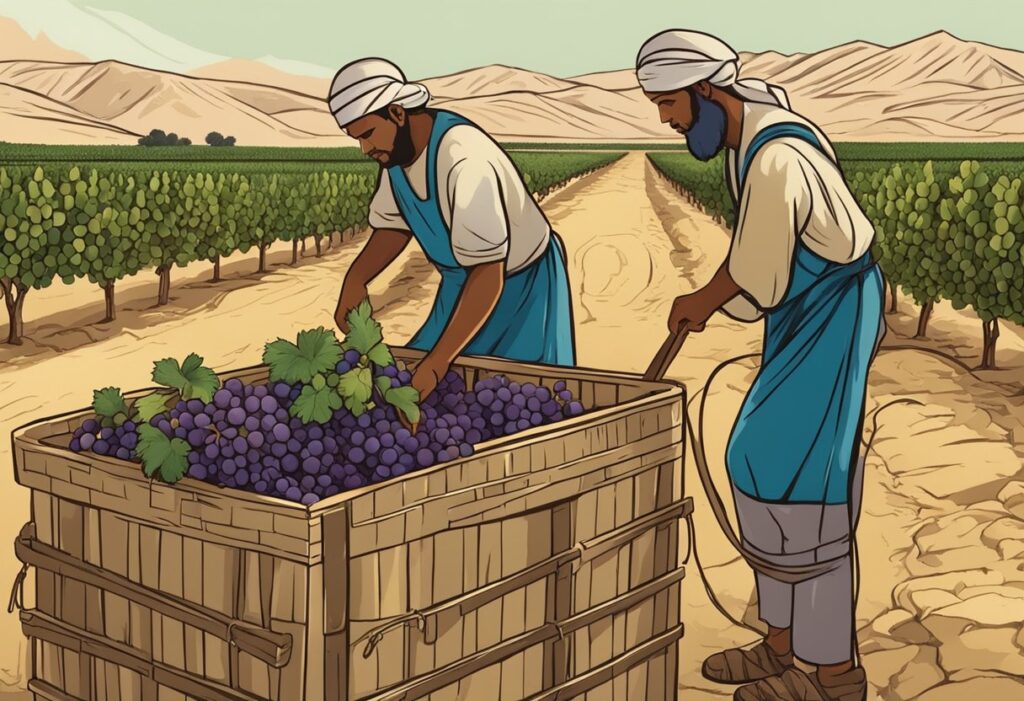
To truly appreciate the complexity of Egyptian wine culture, you must consider both the meticulous preservation and the advancement of documentation methods.
Archaeological Findings
You’ll find that the preservation of ancient Egyptian winemaking tradition is deeply intertwined with ceramics used to store wine. Excavated viticulture and winemaking scenes depicted on tomb walls provide a visual narrative of the ancient methods. For insights on archaeological sites that unveil some of the world’s earliest wineries, you can explore this knowledge further at earliest wineries.
Cultural Heritage and Digital Records
Cultural heritage goes beyond physical artifacts; it includes the stories and practices behind them. With advancements in digital heritage, meticulous documentation efforts have transferred this knowledge to digital platforms, ensuring it withstands time. Paleogenomics offers a novel approach to studying ancient residues, providing genetic snapshots that enrich your understanding of ancient Egyptian wines.
Wine Tourism in Modern Egypt
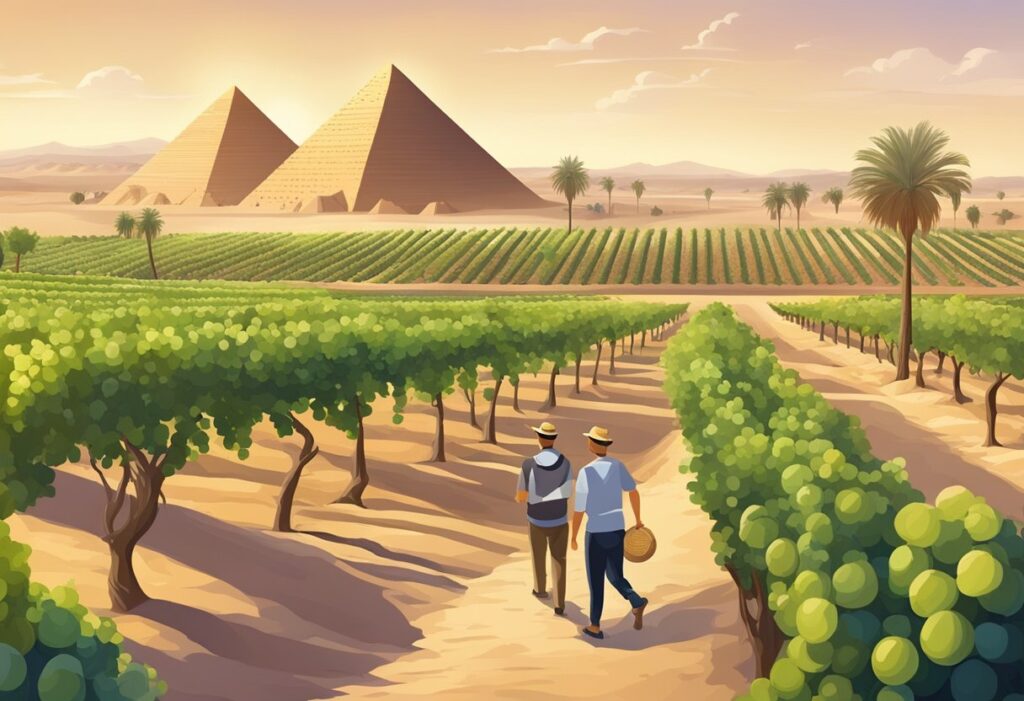
Discover how Egypt is embracing wine tourism with unique winery tours and tasting experiences that highlight the nation’s rich viticultural history. Savor the local wines alongside traditional Egyptian cuisine, offering an enriching experience for food and wine enthusiasts alike.
Winery Tours and Tasting Experiences
Your journey through Egypt’s wine regions reveals a blend of ancient tradition and modern innovation. Explore the famed Nile Delta, where vineyards benefit from the fertile soils and distinct climate. Here, you can visit Kouroum of the Nile winery, a notable example where the winemaking process showcases the region’s natural terroir.
Guided tours often include a walk through the vineyards, an explanation of the wine production stages, and of course, tastings of their exquisite wines. Many wineries that welcome tourists offer a selection of tastings, allowing you to uncover the nuances of Egyptian wines from rich reds to crisp whites.
Integration with Egyptian Gastronomy
Combining wine with local gastronomy gives you a holistic taste of Egypt’s culture. Egyptian cuisine, often paired with veal or other traditional dishes, is being increasingly served at wineries to complement the tasting experience.
As you sip on a glass of wine, relish the harmonious pairing with dishes seasoned with local herbs and spices. These culinary experiences not only cater to the taste buds of tourists but also immerse them in a full sensory appreciation of the region’s bounty.
Global Recognition and Awards

Your appreciation for Egyptian wine will deepen as you discover its recent international acclaim and presence on the world stage.
International Accolades for Egyptian Wines
Egyptian wines have been garnering attention due to their success in international competitions. Beausoleil and other local brands have won several international awards, reflecting the quality and uniqueness of the wine produced in this region.
For example, Egyptian wines have proudly received medals including Bronze at the Decanter World Wine Awards in 2012, an achievement that showcases the potential and quality of the Egyptian wine industry.
Promotion of Egyptian Wine on a Global Stage
Egyptian wineries are actively working to promote their wines globally, with brands like Stella Beer and Grand Marquis leading the charge. Cooperation with Perelada Fine Estates has also been pivotal in placing Egyptian wine on the world map.
Through these efforts, Egyptian wine is gaining the recognition it deserves on an international scale, inviting connoisseurs and enthusiasts alike to explore its rich flavors and heritage.

